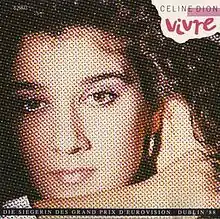The Best of Celine Dion
The Best of Celine Dion is the third French-language compilation album by Canadian singer Celine Dion, released by Carrere Records in selected European countries on 2 May 1988, preceded by the Eurovision-winning song, "Ne partez pas sans moi". The album was also released in few other European countries. In Germany, it was issued with a different cover and titled Vivre.
| The Best of Celine Dion | ||||
|---|---|---|---|---|
 | ||||
| Compilation album by | ||||
| Released | 2 May 1988 | |||
| Recorded | 1982–1988 | |||
| Genre | Pop | |||
| Length | 44:55 | |||
| Label | Carrere | |||
| Producer |
| |||
| Celine Dion chronology | ||||
| ||||
| Alternative cover | ||||
 Vivre | ||||
| Singles from The Best of Celine Dion | ||||
| ||||
Background
On 30 April 1988, Dion won the Eurovision Song Contest in Dublin, Ireland. She represented Switzerland with the song "Ne partez pas sans moi". After this success, the single was released in selected European countries on 2 May 1988 and Dion promoted it in mid-May in Switzerland, France, Denmark, Germany, Finland and Italy. The single entered the European charts reaching number one in Belgium, number eleven in Switzerland, number thirty-six in France and number forty-two in the Netherlands. Then Carrere Records / Mega Records issued a compilation of Dion's songs, including "Ne partez pas sans moi". The album titled The Best of Celine Dion was released in Switzerland, France, Belgium, Netherlands and Luxembourg on 2 May 1988.[1][2] In Germany it was re-titled to Vivre and issued with a different cover but the same track listing.[3]
Content
The Best of Celine Dion starts with the 1988 Eurovision-winning song, "Ne partez pas sans moi". The other songs were previously released in France on Du soleil au cœur (1983) and Les oiseaux du bonheur (1984) or on the singles only: "C'est pour vivre" (1985), "Billy" (1986), "Je ne veux pas" (1987) and "La religieuse" (1988). Aside from "Ne partez pas sans moi", the album also contains another hit-song, "D'amour ou d'amitié" which reached top ten in France in 1983 and was certified Gold by the SNEP for selling over 700,000 copies. All older songs (1982–1986) were produced by Eddy Marnay and Rudi Pascal. The newer tracks (1987–1988) were produced by Romano Musumarra, Didier Barbelivien, Urs Peter Keller and Atilla Şereftuğ.[4]
Track listing
| No. | Title | Writer(s) | Producer(s) | Length |
|---|---|---|---|---|
| 1. | "Ne partez pas sans moi" |
| 3:07 | |
| 2. | "Billy" |
|
| 2:58 |
| 3. | "Je ne veux pas" |
| Musumarra | 3:50 |
| 4. | "D'amour ou d'amitié" |
|
| 3:59 |
| 5. | "Mon ami m'a quittée" |
|
| 3:00 |
| 6. | "C'est pour vivre" |
|
| 3:58 |
| 7. | "La religieuse" | Didier Barbelivien | Barbelivien | 3:55 |
| 8. | "C'est pour toi" |
|
| 4:02 |
| 9. | "Les chemins de ma maison" |
|
| 4:17 |
| 10. | "Trois heures vingt" |
|
| 3:38 |
| 11. | "Les oiseaux du bonheur" |
|
| 3:33 |
| 12. | "Benjamin" |
|
| 4:38 |
| Total length: | 44:55 | |||
Release history
| Region | Date | Label | Format | Catalog |
|---|---|---|---|---|
|
2 May 1988 | Carrere | CD | 96-545 |
| LP | 66-545 | |||
| Cassette | 76-545 | |||
| Germany[1] | CD | CAR 8 26833 | ||
| LP | CAR 6 26833 | |||
| Cassette | CAR 4 26833 | |||
|
Mega | CD | MRCD 3314 | |
| LP | MRLP 3314 | |||
| Cassette | MRMC 3314 |
References
- "Switzerland Wins Eurovision '88" (PDF). Music & Media. 14 May 1988. p. 3. Retrieved 2 May 2019.
- "Who Will Win This Year's Eurovision?" (PDF). Music & Media. 23 April 1988. p. 15. Retrieved 18 May 2019.
- Glatzer, Jenna (2005). Céline Dion: For Keeps. Andrews McMeel Publishing. ISBN 0-7407-5559-5.
- Beaunoyer, Jean; Beaulne (2004). Don Wilson (ed.). Rene Angelil: The Making of Céline Dion: The Unauthorized Biography. Dundurn Group. ISBN 1-55002-489-2.
External links
- The Best of Celine Dion at Discogs (list of releases)
- Vivre at Discogs (list of releases)